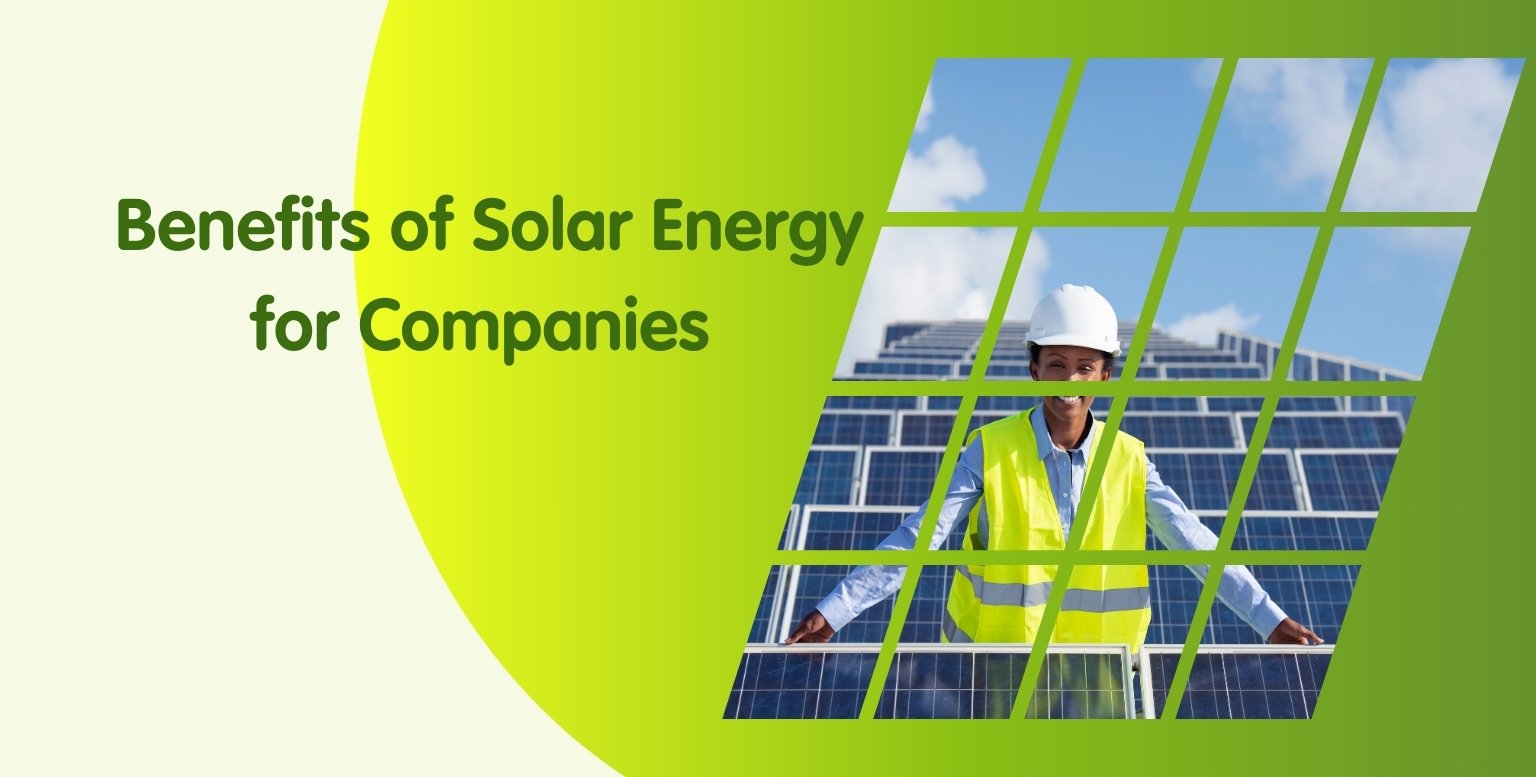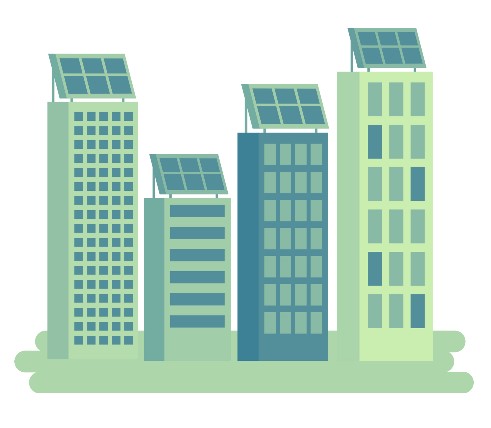Your basket is currently empty!
Written by
Benefits of Solar Energy for Companies: A Practical Guide

Solar energy for companies offers a unique blend of financial savings, energy independence, and environmental benefits.
By investing in solar, businesses can reduce their operational costs with commercial solar panels and shield themselves from volatile energy prices.
This guide explores the top benefits, costs, financial incentives, and more to help you decide if solar energy for companies is right for your company.
Key Takeaways
- Investing in solar energy allows companies to reduce operational costs, achieve energy independence, and enhance their environmental reputation.
- Understanding the costs of solar panel installation, including installation and maintenance expenses, is crucial for businesses to plan for long-term savings.
- Financial incentives, such as tax relief, grants, and the Smart Export Guarantee, can significantly improve the return on investment for businesses adopting solar energy.
Why Companies Should Invest in Solar Energy

Investing in solar energy is a smart move for companies looking to reduce their operational costs while embracing renewable energy.
One of the most immediate benefits is the significant cost reduction achieved by using free electricity generated from solar panels.
Businesses that operate during daylight hours can optimise their savings and efficiency by harnessing solar power directly.
Additionally, the Smart Export Guarantee allows companies to sell any excess electricity back to the grid, creating an additional revenue stream.
Beyond cost savings, solar energy provides businesses with a predictable energy source, shielding them from the volatility of market energy prices.
This predictability helps companies manage their budgets more effectively and reduces their dependence on traditional energy providers.
Generating their own electricity allows businesses to achieve greater energy independence, insulating them from external energy fluctuations.
Moreover, investing in solar power enhances a company’s reputation by demonstrating a commitment to environmental responsibility.
The environmental benefits are substantial, as solar energy significantly reduces a business’s carbon footprint.
Overall, adopting solar energy aligns with sustainability goals, offers long-term cost savings, and showcases a business’s dedication to clean energy.
Costs of Installing Commercial Solar Panels
Understanding the costs involved in commercial solar panel installation is crucial for any business considering this investment. The total cost can vary widely based on factors such as system size, type of panels, and specific installation requirements.
However, it’s worth noting that the prices of commercial solar panels have significantly dropped over recent years, making this technology more accessible for businesses.
A structured program of works, detailing payment milestones corresponding to the completion of specific tasks, is often established to manage the investment effectively.
To provide a clearer picture, the costs can be broken down into two main categories: installation costs and maintenance expenses.
Installation costs encompass the initial expenses of setting up the system, while maintenance expenses cover the ongoing costs to keep the system running efficiently.
Knowing these components helps businesses plan their investment and anticipate long-term savings.
Installation Costs

The installation costs of commercial solar panels are influenced by several factors, including:
- System size
- Roof space
- Labor
- The brand of panels chosen
For instance, the installation price can start around £5,000 and go up to £20,000 for each kW installed.
Larger systems typically benefit from a lower cost per kW compared to smaller installations, making them more cost-effective in the long run.
Ground-mounted systems, although offering flexibility in orientation, often require more space and can increase installation costs compared to rooftop systems.
Labour requirements for large installations can also drive up costs due to the need for more workers.
The approximate cost to install a 10kW system is around £2,000 (excluding VAT), and the choice of brand can further impact the overall cost.
Maintenance Expenses
One of the appealing aspects of commercial solar panels is their low maintenance costs.
Maintenance expenses are typically around £9.50 per panel annually.
Basic upkeep involves light cleaning to remove dust and debris, ensuring the panels operate at maximum efficiency.
Routine maintenance also includes inspecting electrical connections to prevent any potential issues.
Overall, the minimal maintenance requirements lead to lower ongoing costs and greater financial efficiency for solar panel owners.
Businesses can enjoy significant cost savings over the lifespan of their solar PV systems, making this a financially sound investment.
Financial Incentives for Commercial Solar Installations
To further sweeten the deal, numerous financial incentives are available for businesses investing in solar energy.

These incentives, including tax relief, grants, and rebates, are designed to offset initial installation costs and enhance financial returns.
The UK government offers substantial support for businesses investing in solar photovoltaic (PV) panels, making solar energy a more attractive option.
These incentives can significantly boost the return on investment (ROI) and make the transition to renewable energy more financially viable.
Businesses can potentially earn hundreds of pounds each year from their solar investments, thanks to the Smart Export Guarantee, which pays for excess energy exported back to the grid.
Various financial solutions, such as asset finance and power purchase agreements offered by companies like Solarsense, further assist businesses in managing their solar investments.
Additionally, Salix Funding provides interest-free capital for public sector entities to invest in energy-efficient technologies.
Tax Incentives
One of the most significant financial benefits for businesses installing commercial solar panels is tax relief.
Eligible businesses can benefit from tax incentives that substantially offset installation costs and accelerate the ROI.
For example, the 50% First Year Allowance enables businesses to deduct half of their installation costs from their profits in the first year.
This considerable tax saving can make solar projects more attractive and financially feasible.
From April 2022, the VAT on solar panel purchases has been reduced to 0% for a duration of five years, further reducing the initial investment required.
These tax incentives provide businesses with a compelling reason to consider solar energy, given the significant financial savings and environmental benefits.
Grants and Rebates
In addition to tax incentives, various government initiatives and grants are available to support commercial solar panel installations.
Organisations like Solarsense provide numerous grants that can help offset the upfront costs.
These grants and funding opportunities can significantly reduce the financial burden of installing solar panels, making it easier for businesses to adopt this renewable technology.
For public sector entities, Salix Funding offers interest-free capital to promote investments in energy-efficient technologies.
Leveraging these grants and rebates allows businesses to achieve substantial cost savings and transition more smoothly to solar energy.
How Solar Energy Reduces Energy Bills
One of the primary benefits of solar energy for businesses is the significant reduction in energy bills.
By generating their own electricity, businesses can greatly reduce their dependence on traditional energy providers and save on annual electricity costs.
This results in substantial financial relief, as companies no longer solely rely on the National Grid for their energy needs.
Furthermore, solar energy provides businesses with greater energy independence, insulating them from fluctuating energy prices.
Integrating solar panels with battery storage solutions can maximise these savings and further reduce dependency on external energy sources.
Specialised tools and industry-leading software are available to help businesses predict their savings from solar energy and make informed decisions.
Types of Commercial Solar Panel Systems
There are various types of commercial solar panel system available, each suited to different business needs and site conditions.
The two main types are rooftop and ground-mounted systems. Roof-mounted systems are commonly installed directly on the roof using specialised racking systems such as solar panels for a warehouse roof.
These systems are ideal for businesses with sufficient roof space and can be customised to fit different building orientations.
Ground-mounted systems, on the other hand, are installed on the ground and can face any direction to maximise solar energy production.
These systems are suitable for businesses with ample land but limited roof space and can be designed to meet high local energy demands.
Carport installations are another innovative option, allowing solar panels to be mounted over parking areas, providing shade and protection while generating electricity.
Rooftop Solar Panels
Rooftop solar panels are an increasingly popular choice among businesses due to their versatility and efficiency.
The rising wholesale energy prices have driven interest in these cost-effective energy solutions.
Rooftop systems can be customised to fit various roof types, including flat roofs, making them suitable for almost any commercial building.
This adaptability ensures that businesses can maximise their roof space to generate significant amounts of solar power.
Ballast mounts for flat roofs enable the installation of solar panels without penetrating the roof, preserving the building’s structural integrity.
However, it’s essential to assess the roof’s structural integrity before installation to ensure it can support the weight of the panels and mounting systems.
Rooftop commercial rooftop solar panels offer a practical and efficient way for businesses to harness renewable energy while utilising existing infrastructure.
Ground-Mounted Solar Panels
Ground-mounted solar panels are an excellent alternative for businesses where rooftop installations are not viable.
These systems can be oriented to face south, optimising their energy generation capabilities.
They are particularly advantageous for businesses with large tracts of land but limited roof space, enabling higher on-site energy production.
Ground-mounted arrays may be a better option if the roof is unsuitable due to its shape, orientation, or the presence of skylights and vents.
However, these systems require planning permission and feasibility assessments to ensure they meet local regulations and site conditions.
Investing in ground-mounted solar panels allows businesses to effectively generate renewable energy and reduce their dependence on external energy sources.
Battery Storage Solutions for Businesses
Integrating battery storage solutions with solar panels can significantly enhance energy reliability and financial benefits for businesses.
Battery storage systems allow companies to store excess energy generated during the day and use it when needed, providing a consistent energy supply and reducing reliance on the grid.
This is particularly beneficial during power outages, as commercial battery storage can operate independently from the grid, ensuring uninterrupted operations.
Advanced battery systems, such as the Tesvolt TS HV 70, offer long lifespans and fast charging capabilities, making them ideal for commercial applications.
Businesses with varied energy needs, like restaurants, can benefit from battery solutions like the Tesla Powerwall to maximise their solar energy usage and achieve significant cost savings.
Adopting battery storage enhances a company’s energy independence and sustainability efforts.
Environmental Impact of Solar Energy
Adopting solar energy can significantly lower a business’s carbon emissions and contribute to broader sustainability efforts.
Solar energy production emits far fewer greenhouse gases compared to fossil fuels, making it a cleaner and more environmentally friendly option.
This reduction in harmful emissions helps mitigate climate change and promotes a sustainable future.
Furthermore, generating electricity on-site with solar panels reduces a business’s carbon footprint and overall environmental impact.
Companies are increasingly focusing on sustainable manufacturing processes to lessen the environmental footprint associated with solar panel production.
Innovative recycling programs for solar panels are also emerging, addressing environmental concerns at the end of their lifecycle. Investing in solar energy demonstrates a business’s commitment to environmental sustainability and sets an example in the industry.
Planning and Installing Commercial Solar Panels
Planning and installing commercial solar panels involves several critical steps to ensure a successful solar project.
Conducting an energy needs assessment and site feasibility study is crucial for determining the viability of a solar project.
Complying with local regulations and obtaining necessary permits is essential before proceeding with installation.
The installation process itself involves mounting solar panels to structures, wiring them correctly, and ensuring they are securely in place.
A structured approach to planning and installation helps businesses navigate the complexities of solar projects and achieve optimal results.
The subsections below detail the key aspects of feasibility assessment, permits and regulations, and the installation process.
Feasibility Assessment
Assessing utility bills and energy usage is crucial before evaluating solar panel feasibility. An energy needs assessment helps design a system that best suits on-site energy usage.
This assessment considers energy curves, feasibility studies, sunlight availability, roof orientation, shading, and structural integrity. Detailed site surveys and ensuring planning permissions are also part of the initial assessments for solar panel installation.
To calculate the appropriate commercial solar pv system size for commercial buildings, factors such as available roof space, current or estimated electricity costs, and self-consumption rates must be considered.
This comprehensive evaluation ensures the solar system meets the specific energy needs of the business.
Permits and Regulations
Understanding and complying with permits and regulations is essential for businesses to ensure compliance when installing solar panels.
In some cases, planning permission is required for commercial solar panel installation, especially if the panels are on flat roofs or in conservation areas.
Specific areas that may require additional planning permissions include historical sites, world heritage sites, and conservation areas.
A G99 application must be submitted to the local Distribution Network Operator for grid connection, which can take several months.
Navigating these regulatory requirements is crucial to avoid project delays and ensure the smooth installation of solar panels.
Installation Process
The installation process of solar panels involves several key steps, including:
- Mounting
- Panelling
- Stringing
- Fitting inverters
- Testing
- Commissioning
Installation is typically performed by experienced in-house teams and subcontractors, ensuring that the system is set up correctly and efficiently.
Following these steps ensures that the solar PV system operates at peak performance and delivers the expected energy savings.
Monitoring and Maintenance of Solar PV Systems
Effective management during installation is crucial to avoid risks and ensure the system’s long-term performance.
Monitoring, operation, and maintenance services are included in the operations and maintenance for business solar panels, ensuring that the system continues to function efficiently.
Monitoring systems track solar panel energy output and notify users of any malfunctions or drops in efficiency, enabling prompt corrective actions.
Regular maintenance tasks, such as cleaning the panels two to four times a year to remove dirt and debris, are essential to maintain optimal performance.
Solar panels are generally low-maintenance, but manual cleaning may be necessary in dry periods or after snowfall. Tilted panels benefit from natural rain cleaning, reducing the need for frequent maintenance.
By adhering to a regular maintenance schedule, businesses can ensure their solar PV systems deliver consistent performance and savings.
Case Studies: Successful Solar Projects
Real-life case studies demonstrate the tangible benefits of commercial solar projects. For example, Ebay’s solar installation has a capacity of 650 kW, resulting in expected annual savings of $100,000.
Absolute Coatings installed an 82 kW solar system, projected to save approximately $442,866 over its lifespan.
These examples highlight the significant financial benefits businesses can achieve by adopting solar energy.
Ryan and Ryan Insurance installed a 16.3 kW solar system covering their entire electricity consumption, with projected savings of $69,654 over its lifetime.
Hewlett Packard’s 1 MW solar array is anticipated to deliver $1 million in savings over its lifetime.
These success stories illustrate how businesses from various industries can leverage solar energy to reduce costs, enhance sustainability, and improve their brand image.
Summary
In summary, investing in solar energy offers numerous benefits for businesses, including significant cost savings, enhanced energy independence, and a reduced carbon footprint.
By understanding the costs, financial incentives, and installation processes, companies can make informed decisions and successfully transition to renewable energy.
The case studies presented demonstrate the substantial financial and environmental gains achievable through solar projects.
Embracing solar energy is not just a step towards sustainability but a strategic move that can propel businesses towards a brighter, more energy-efficient future.
Frequently Asked Questions
How do solar panels work with energy companies?
Solar panels generate direct current electricity, which is converted to alternating current by an inverter. This electricity can then be used on-site or fed into the National Grid, allowing users to benefit from their energy production.
How much are solar panels for a business in the UK?
Solar panels for a business in the UK typically range from £16,000 to £60,000 for systems between 20kW and 50kW. Investing in solar power can lead to reduced costs and increased energy efficiency.
Are solar panels worth it for businesses?
Yes, solar panels are worth it for businesses due to significant savings on energy bills and increased property value, which often outweigh the initial investment. The long-term cost reductions and financial benefits make them a smart choice for commercial properties.
What are the main benefits of installing commercial solar panels?
Installing commercial solar panels offers substantial cost savings on energy bills, increased energy independence, and contributes to environmental sustainability.
How much does it typically cost to install commercial solar panels?
The typical cost to install commercial solar panels ranges from £5,000 to £20,000 per kilowatt, depending on factors like system size and panel type. This investment can significantly enhance your energy efficiency and sustainability.
Written by
Start Your Solar Project Today
Best Solar Panels & Battery Storage Installation Deals
We price match too!
What is in this article?
- Key Takeaways
- Why Companies Should Invest in Solar Energy
- Costs of Installing Commercial Solar Panels
- Financial Incentives for Commercial Solar Installations
- How Solar Energy Reduces Energy Bills
- Types of Commercial Solar Panel Systems
- Battery Storage Solutions for Businesses
- Environmental Impact of Solar Energy
- Planning and Installing Commercial Solar Panels
- Monitoring and Maintenance of Solar PV Systems
- Case Studies: Successful Solar Projects
- Summary
- Frequently Asked Questions





